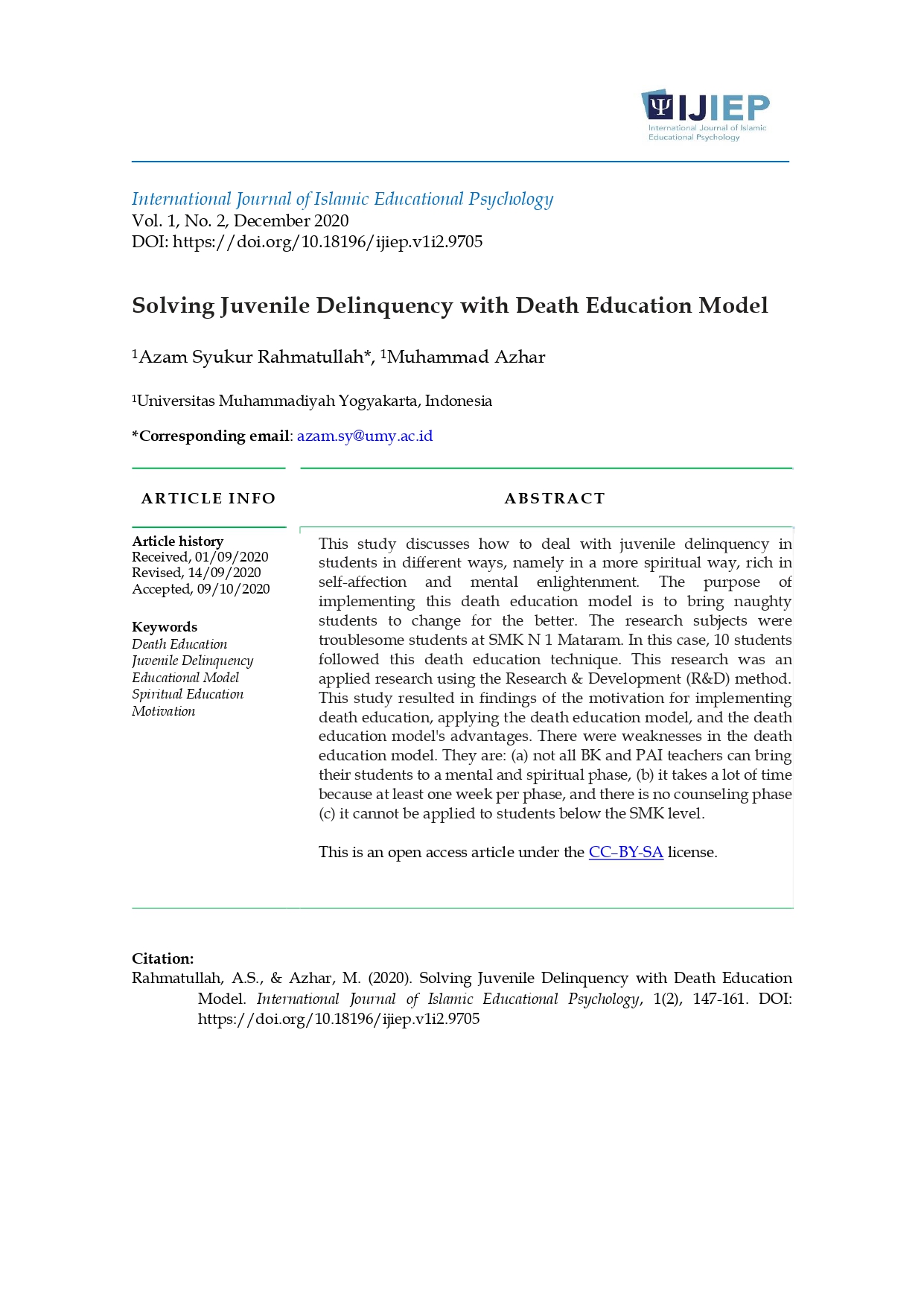Solving Juvenile Delinquency with Death Education Model
DOI:
https://doi.org/10.18196/ijiep.v1i2.9705Keywords:
Death Education, Juvenile Delinquency, Educational Model, Spiritual Education, MotivationAbstract
This study discusses how to deal with juvenile delinquency in students in different ways, namely in a more spiritual way, rich in self-affection and mental enlightenment. The purpose of implementing this death education model is to bring naughty students to change for the better. The research subjects were troublesome students at SMK N 1 Mataram. In this case, 10 students followed this death education technique. This research was an applied research using the Research & Development (R&D) method. This study resulted in findings of the motivation for implementing death education, applying the death education model, and the death education model's advantages. There were weaknesses in the death education model. They are: (a) not all BK and PAI teachers can bring their students to a mental and spiritual phase, (b) it takes a lot of time because at least one week per phase, and there is no counseling phase (c) it cannot be applied to students below the SMK level.
References
Abd. Rachman Assegaf. (2004). Pendidikan tanpa kekerasan: tipologi kondisi, kasus, dan konsep. Tiara Wacana.
Allen N. Mendler. (2001). Mendidik dengan hati : kiat membina hubungan belajar mengajar yang akrab dengan murid. PT Mizan Pustaka.
Bahiroh, S., & Suud, F. M. (2020). Preventive Counseling: A Religious Development Program at Boarding School in Yogyakarta. Humanities & Social Sciences Reviews, 8(2), 614-23.
Bahiroh, S., & Suud, F. M. (2020). Model Bimbingan Konseling Berbasis Religiusitas dalam Mengatasi Kesulitan Belajar Siswa. Islamic Counseling: Jurnal Bimbingan dan Konseling Islam, 4(1), 31-50.
Hoerunisa, E., Wilodati, W., & Kosasih, A. (2018). Strategi Pihak Pesantren Dalam Mengatasi Santri Yang Melakukan Perilaku Menyimpang. Sosietas, 7(1). https://doi.org/10.17509/Sosietas.V7i1.10344
Nguku, W. C., Chege, K., Odera, P., & J, N. (2017). Effect of Counseling/Modeling on Behaviour Modification of Juvenile Delinquents in Eldoret and Kakamega Rehabilitation Centres. European Scientific Journal, ESJ, 13(32), 225. https://doi.org/10.19044/esj.2017.v13n32p225
Nisa, A. (2019). Analisis Kenakalan Siswa Dan Implikasinya Terhadap Layanan Bimbingan Konseling. Jurnal Edukasi: Jurnal Bimbingan Konseling, 4(2), 102. https://doi.org/10.22373/Je.V4i2.3282
Omoniyi, M. B. I. (2011). Juvenile Crimes and Its Counseling Implications. Journal of Psychology, 2(1), 1–6. https://doi.org/10.1080/09764224.2011.11885455
Purer, P., & Walker, J. R. (2008). Death anxiety: A cognitive-behavioral approach. Journal of Cognitive Psychotherapy, 22(2), 167–182. https://doi.org/10.1891/0889-8391.22.2.167
Purwita, A. W., & Sumbawati, M. S. (2016). Pengembangan Media Pembelajaran Berbasis Mobile Learning (M-Learning) Pada Mata Pelajaran Sistem Komputer Kelas X Multimedia Smk Negeri 1 Cerme. IT-Edu, 1(1), 71–79.
Rahmatullah, A. S. (2016). Pendidikan Kematian (Death Education) Sebagai Upaya Penanganan Kenakalan Peserta Didik Remaja (Juvenile Delinquency) Di Sekolah/Madrasah (Best Practice Pada Madrasah Aliyah Plus “Nururrohmah” Tambaksari Kuwarasan Kebumen Jawa Tengah). Prosiding Konferensi Nasional Ke 4, 1.
Rahmatullah, A. S. (2019). Kenakalan Remaja dalam Perspektif Psikologi Pendidikan Islam. Graceindo.
Rahmatullah, A. S. (2020). Pendidikan Parenting Kenakalan Remaja; Kiat-kiat Menjadi Remaja Ideal dalam Kacamata Psikologi Pendidikan Islam. Pustaka Ilmu Group.
Rosenthal, N. R. (1980). Adolescent Death Anxiety: The Effect of Death Education. 101(1), 95–101.
Schramm, D. K. C. (1998). The Concept of Death Education on Children's Understanding of Death. Grand Valley State University.
Schultz, D. (1991). Psikologi Pertumbuhan; Model-model Kepribadian Sehat. Kanisius.
Setiawan, W., & Iman, N. (2019). Filantropi Islam Sebagai Media Peningkatan Kebahagiaan Muslim Indonesia. Paper presented at the Proceedings of Annual Conference for Muslim Scholars.
Setiawan, W., Suud, F. M., Chaer, M. T., & Rahmatullah, A. S. (2018). Pendidikan Kebahagiaan dalam Revolusi Industri 4. AL-MURABBI: Jurnal Studi Kependidikan dan Keislaman, 5(1), 101-120.
Sujarwo, S., Tristanti, T., & Santi, F. U. (2017). Pengembangan Model Pemberdayaan Perempuan Desa Wisata Melalui Pendidikan Berbasis Komunitas. Jurnal Penelitian Ilmu Pendidikan, 10(1), 75–85. https://doi.org/10.21831/jpipfip.v10i1.16798
Sultoni, A., Wasim, A. T., & Fauzan, A. (2020). Development of Prophetic Intelligence (Phenomenology Study of Religious Transformation). International Journal of Islamic Educational Psychology, 1(1), 12-24. 10.18196/ijiep.1102
Sumara, D. S., Humaedi, S., & Santoso, M. B. (2017). Kenakalan Remaja Dan Penanganannya. Prosiding Penelitian Dan Pengabdian Kepada Masyarakat, 4(2), 129–389. https://doi.org/10.24198/jppm.v4i2.14393
Syahatah, husein husein. (2003). Membersihkan jiwa dengan Muhasabah. kitab intropeksi diri untuk menuai kesucian diri. Mitra Pustaka.
Zhang, H., Hu, M., Zeng, L., Ma, M., & Li, L. (2020). Impact of death education courses on emergency nurses' perception of effective behavioral responses in dealing with sudden death in China: A quasi-experimental study. Nurse education today, 85, 104264. https://doi.org/10.1016/j.nedt.2019.104264

Downloads
Additional Files
Published
How to Cite
Issue
Section
License

- Share — copy and redistribute the material in any medium or format
- Adapt—remix, transform, and build upon the material for any purpose, even commercially.
The licensor cannot revoke these freedoms as long as you follow the license terms. Under the following terms:
- Attribution: You must give appropriate credit, provide a link to the license, and indicate if changes were made. You may do so in any reasonable manner, but not in any way that suggests the licensor endorses you or your use.
- ShareAlike: If you remix, transform, or build upon the material, you must distribute your contributions under the same license as the original.
- No additional restrictions — You may not apply legal terms or technological measures that legally restrict others from doing anything the license permits.






